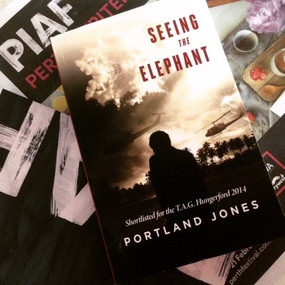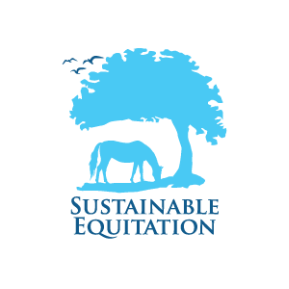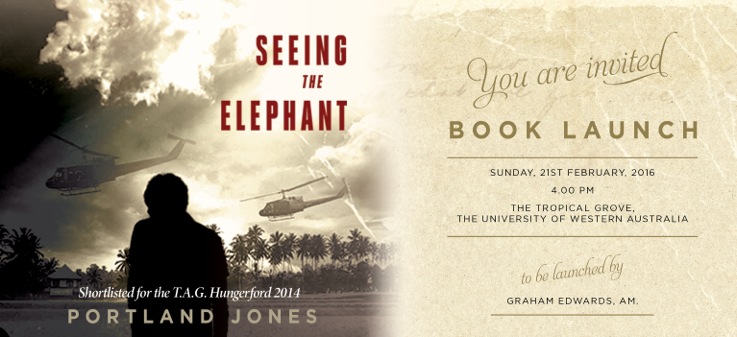
A few years ago I decided (the sort of decision you make when blind ignorance and extreme optimism collide) that when my third and youngest child started school it might be fun to do a PhD. I was interested in Australia's involvement in the Vietnam War and the differences between that experience and popular culture representations of the war – which are mostly driven by the US experience. So, I signed up and started researching. I was working and raising a family, and such is the nature of the horse industry that I would usually get an hour or so to research before picking the kids up from school and starting afternoon lessons. The early months of my research became, for me, a series of moments of extreme cognitive dissonance – standing in the playground watching children play and thinking about Post Traumatic Stress, Ho Chi Minh and land mines...
During that time we went on our first family holiday to Exmouth. After about seven hours of driving I knew the Wiggles entire discography by heart and the children were starting to disappear beneath a drift of muesli bar wrappers and empty juice boxes. We stopped at the Overlander Roadhouse and as I was walking the kids to the toilets I noticed a man sitting, eating a hamburger in a white Subaru and on the window of his car a small sticker that read AATTV (Australian Army Training Team Vietnam). On the way back to the car I tapped on his window and introduced myself.
He was happy to talk about his experiences in Vietnam and we stood in the car park and the kids played on this scratchy little patch of grass while road trains tore down the highway. He'd done two tours of duty, the second had been worse because he'd been married by then and leaving had been harder. He told me about his experiences with Post Traumatic Stress. About ten years after his last tour things had got pretty bad and he'd decided he was going to blow up his boss. He'd worked out a way to disable the locking mechanism in his boss's car and was just working out how much chlorine he was going to need for the bomb when his wife discovered what he'd been doing and he was committed. He coughed and said that there were years when things had been hard, really hard.
During that time we went on our first family holiday to Exmouth. After about seven hours of driving I knew the Wiggles entire discography by heart and the children were starting to disappear beneath a drift of muesli bar wrappers and empty juice boxes. We stopped at the Overlander Roadhouse and as I was walking the kids to the toilets I noticed a man sitting, eating a hamburger in a white Subaru and on the window of his car a small sticker that read AATTV (Australian Army Training Team Vietnam). On the way back to the car I tapped on his window and introduced myself.
He was happy to talk about his experiences in Vietnam and we stood in the car park and the kids played on this scratchy little patch of grass while road trains tore down the highway. He'd done two tours of duty, the second had been worse because he'd been married by then and leaving had been harder. He told me about his experiences with Post Traumatic Stress. About ten years after his last tour things had got pretty bad and he'd decided he was going to blow up his boss. He'd worked out a way to disable the locking mechanism in his boss's car and was just working out how much chlorine he was going to need for the bomb when his wife discovered what he'd been doing and he was committed. He coughed and said that there were years when things had been hard, really hard.
He said that he needed to get going because his wife was expecting him. He'd been fishing, something that he'd always loved to do. He told me that he thought this would probably be his last trip though because he had cancer and it was pretty much all through him. And that he wasn't giving up but the doctors had given him low odds of making it to Christmas. And this was July. When he drove off I watched his car dwindle down the highway and I felt very strongly that I needed to do something to record that, to bear witness in some way and to keep the stories alive. I wanted to add another voice to the fairly small body of work about the Vietnam War that specifically related to the Australian experience. I wanted my children to understand that one of Australia's most iconic bits of popular culture relating to the war (Cold Chisel's Khe Sanh) was about a siege that Australian soldiers didn't even fight. And they could have called the song Long Tan (a battle which stands as testament to the Australian soldier's courage and resilience) and it even bloody well rhymes but who would have known what they were talking about?
The title of my novel comes from the term "seeing the elephant" which means to have an experience of such magnitude that it will never be forgotten. It has been used by soldiers to describe their first experience of combat. In my novel the character Frank, when explaining how war changes someone says, "Because you know, without a doubt, that the world will never, ever be the same place again. You’ve seen the elephant and it’s big, so big it can block out the sun forever.”
I only write about war because it terrifies me. It terrifies me as a human being but most of all it terrifies me as a mother. Once you have loved as a parent you can't help but see the world as a place that's populated by other people's children. That each life is as precious, fragile and loved as any new born. And it seems to me that when we talk about other people's children as soldiers they become the tools of nationhood and part of some wider agenda. When what we really need to do is think of them as someone else's precious child, or as a brother or a sister, someone's lover, spouse and best friend. And if we do that, providing services to ensure that their lives are as fulfilling and healthy once they return is less a matter of politics and instead becomes one of national urgency.
After spending nearly a year researching the Vietnam War and its aftermath I started writing. I wrote Seeing the Elephant for lots of reasons... because despite studying history at school I didn't learn about the Vietnam War, because the children of Vietnam War veterans have a suicide rate three times higher than the rest of the population, because some of the veterans I spoke to still talk about the shame of their homecoming, because 3000 of our veterans are homeless and because the US promise of no more Vietnams has long been silenced by torrents of nationalist rhetoric. I wrote Seeing the Elephant because despite the fact that "lest we forget" has become a kind of Anzac Day benediction, I think we do, indeed, forget.
And I think that's a problem.
PJ
The title of my novel comes from the term "seeing the elephant" which means to have an experience of such magnitude that it will never be forgotten. It has been used by soldiers to describe their first experience of combat. In my novel the character Frank, when explaining how war changes someone says, "Because you know, without a doubt, that the world will never, ever be the same place again. You’ve seen the elephant and it’s big, so big it can block out the sun forever.”
I only write about war because it terrifies me. It terrifies me as a human being but most of all it terrifies me as a mother. Once you have loved as a parent you can't help but see the world as a place that's populated by other people's children. That each life is as precious, fragile and loved as any new born. And it seems to me that when we talk about other people's children as soldiers they become the tools of nationhood and part of some wider agenda. When what we really need to do is think of them as someone else's precious child, or as a brother or a sister, someone's lover, spouse and best friend. And if we do that, providing services to ensure that their lives are as fulfilling and healthy once they return is less a matter of politics and instead becomes one of national urgency.
After spending nearly a year researching the Vietnam War and its aftermath I started writing. I wrote Seeing the Elephant for lots of reasons... because despite studying history at school I didn't learn about the Vietnam War, because the children of Vietnam War veterans have a suicide rate three times higher than the rest of the population, because some of the veterans I spoke to still talk about the shame of their homecoming, because 3000 of our veterans are homeless and because the US promise of no more Vietnams has long been silenced by torrents of nationalist rhetoric. I wrote Seeing the Elephant because despite the fact that "lest we forget" has become a kind of Anzac Day benediction, I think we do, indeed, forget.
And I think that's a problem.
PJ


 RSS Feed
RSS Feed
